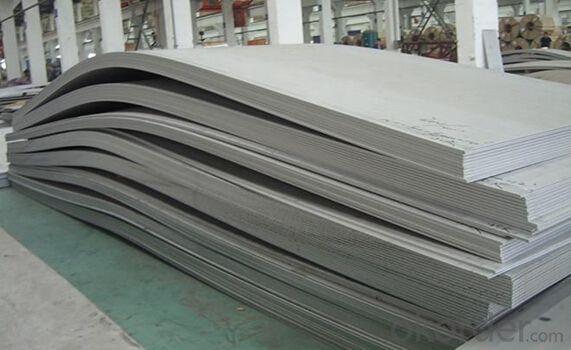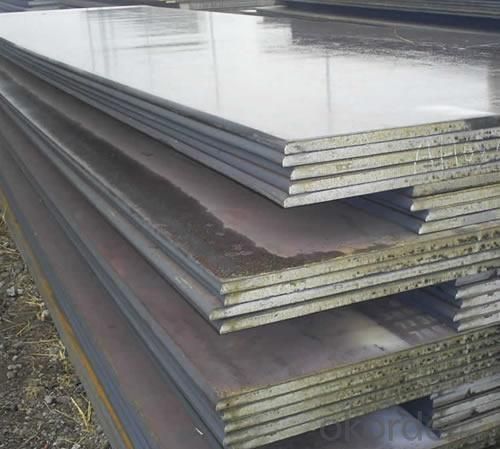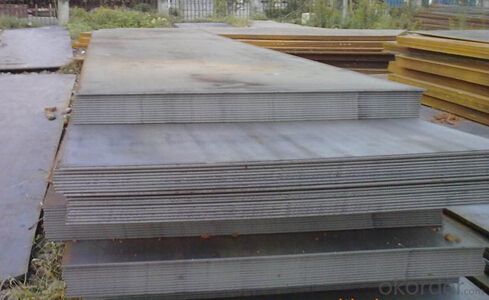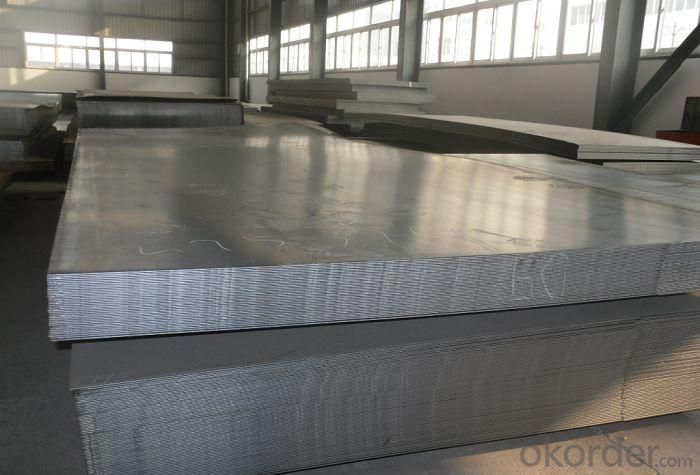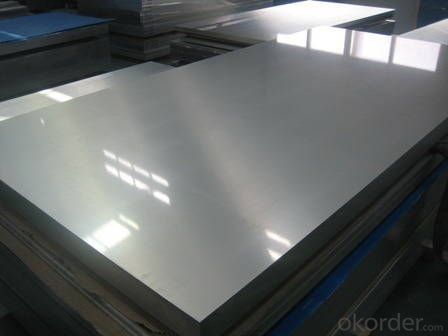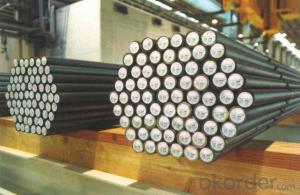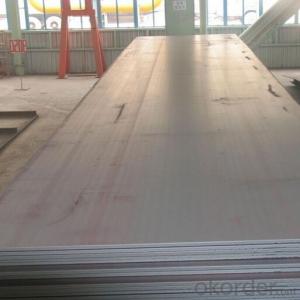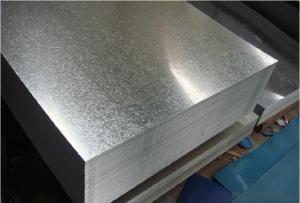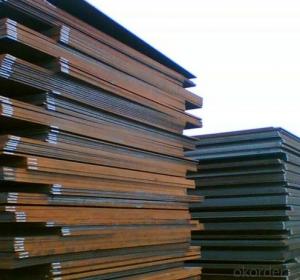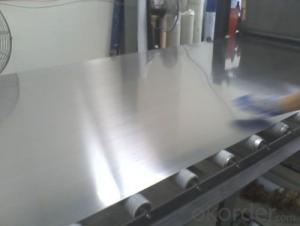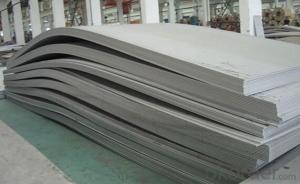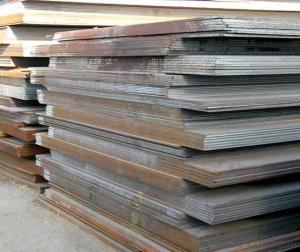S275JR High Strength Carbon Iron Sheet Plates
- Loading Port:
- Tianjin
- Payment Terms:
- TT OR LC
- Min Order Qty:
- 3 m.t.
- Supply Capability:
- 100000 m.t./month
OKorder Service Pledge
OKorder Financial Service
You Might Also Like
Specification
S275JR High Strength Carbon Iron Sheet Plates
Detailed Information of S275JR High Strength Carbon Iron Sheet Plates
| C | Si | P | S | yield Strength MAp | Tensile strength MAp | Elongation % | ||
| S275JR | 0.24 | 0.4 | 0.045 | 0.03 | 250 | 400-520 | 26 | |
| C | Si | Mn | P | S | Cu | |||
| A283 | ≤0.27 | 0.15-0.4 | ≤0.9 | ≤0.035 | ≤0.04 | ≥0.2 | ||
| Thickness: | 6mm, 8mm, 12mm, 16mm, 20mm, 25mm, 30mm, 50mm, 80mm, 100mm, 150mm, 200mm | |||||||
| Width: | 1500mm, 1800mm, 2000mm, 2200mm, 2500mm | |||||||
| Length: | 6000mm, 8000m, can cut to width and length | |||||||
| Packing Details; | according to customer‘s require or export’s standard | |||||||
| Delivery time; | 7 days for stock sizes, 20-25 days for new production sizes | |||||||
| Port: | Tianjin China | |||||||
Related Products Overviews of S275JR High Strength Carbon Iron Sheet Plates
Product Name | Typical Grades | Diameter(mm) | Standard Adopted |
Carbon Steel | 20 (1020/S20C/C22) |
Ø16-Ø300 |
GB/SAE/ JIS/DIN |
40 (1040/S40C/C40) | |||
45 (1045/S45C/C45) | |||
Bearing Steel | GCr9 (51100/SUJ1) |
Ø12-Ø250 | |
GCr15 (52100/SUJ2/100Gr6) | |||
GCr9SiMn (A485-Gr.1/SUJ3) | |||
Cr-Mo Steel | 20Cr (5120/SCr420H/20Cr4) |
Ø12-Ø250 | |
40Cr (5140/SCr440/41Cr4) | |||
42CrMo(4140/SCM440/42CrMo4) | |||
Gear Steel | 20CrNiMo |
Ø16-Ø600 | |
20CrMn(5115/SMnC420/20MnCr5) | |||
20CrNiMo(8620/SNCM220/20CrMiMo2) |
Related Products Application of S275JR High Strength Carbon Iron Sheet Plates
Carbon Steel | l Mold bottom l Plastic mold l Construction machinery parts l Automobile parts l Security grills l Screens l Construction |
Bearing Steel | l Aerospace l Navigation l Nuclear energy l Chemical industry l Electronic information l Petrochemical l Instrument and meter l Transportation |
Cr-Mo Steel | l Mechanism & Fasteners gear l Stressed components for vehicles l Engines and machines l Parts of larger cross-section |
Gear Steel | l All kinds of gears l Statically and dynamically stressed component for vehicles l Engines and machine l Larger cross-section parts l Crankshafts |
Company Introduction of S275JR High Strength Carbon Iron Sheet Plates
CNBM International Corporation is the most import and export platform of CNBM group(China National Building Material Group Corporation) ,which is a state-owned enterprise, ranked in 270th of Fortune Global 500 in 2015.
With its advantages, CNBM International are mainly concentrate on Cement, Glass, Iron and Steel, Ceramics industries and devotes herself for supplying high quality series of refractories as well as technical consultancies and logistics solution.
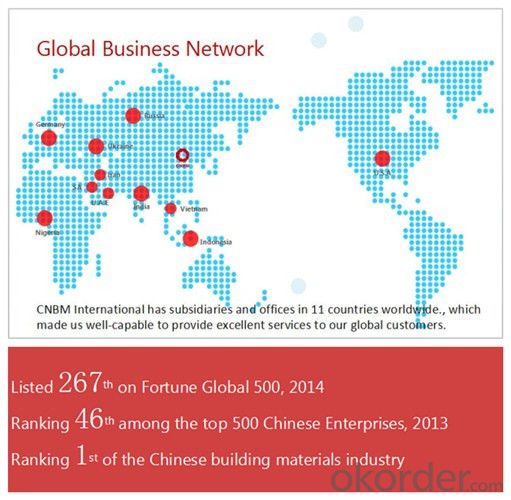
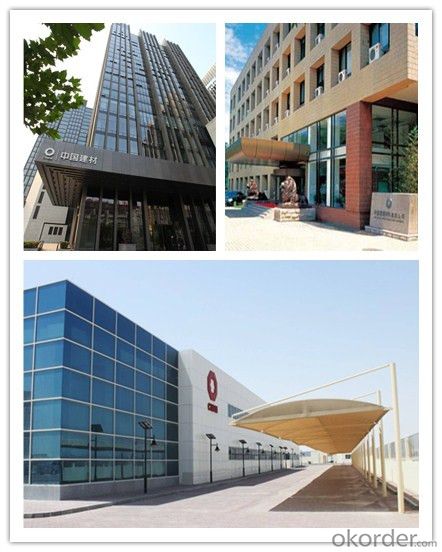
After-sale service | l CNBM provides the services and support you need for every step of our cooperation. We’re the business partners you can trust; you can relax and get on with doing business. l For any problem, please kindly contact us at any your convenient time, we’ll reply you in our first priority within 24 hours
|
Advantages
| l Industry experience over 20 years. l Shipment of goods -More than 70 countries worldwide. l The most convenient transport and prompt delivery. l Competitive price with best service. l High technical production line with top quality products. l High reputation based on best quality products.
|
Packaging & Delivery of S275JR High Strength Carbon Iron Sheet Plates
Packaging Detail | Sea worthy packing /as per customer's packing instruction |
Delivery Detail | 15 ~ 40 days after receiving the deposit |
Products Show
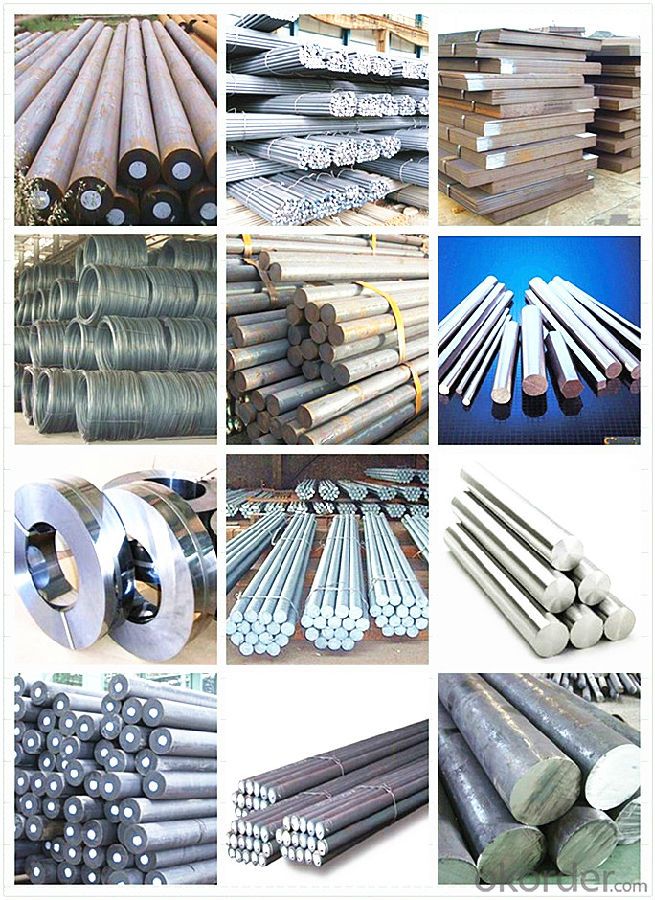
FAQ:
Are you a trading company or manufacturer? | Manufacturer |
What’s the MOQ? | 3 metric ton |
What’s your delivery time? | 15-35 days after downpayment received |
Do you Accept OEM service? | Yes |
what’s your delivery terms? | FOB/CFR/CIF |
What's the Payment Terms? | 30% as deposit,70% before shipment by T/T |
Western Union acceptable for small amount. | |
L/C acceptable for large amount. | |
Scrow ,Paybal,Alipay are also ok | |
Why choose us? | Chose happens because of quality, then price, We can give you both. Additionally, we can also offer professional products inquiry, products knowledge train (for agents), smooth goods delivery, excellent customer solution proposals. |
What's your available port of Shipment? | Main Port, China |
What’s your featured services? | Our service formula: good quality+ good price+ good service=customer's trust
|
Where are your Market? | Covering more than 160 countries in the world |
- Q: How is high-temperature stainless steel used in the production of gas turbines?
- High-temperature stainless steel is used in the production of gas turbines due to its excellent resistance to corrosion and oxidation at elevated temperatures. It is primarily used to manufacture critical components like turbine blades, vanes, and combustion chambers, which are exposed to extreme heat and pressure inside the turbine. The high-temperature stainless steel ensures durability, performance, and longevity of gas turbines, enabling them to operate efficiently in demanding conditions.
- Q: What are the different classifications of special steel?
- Various types of steel alloys fall under the category of special steel, each possessing unique properties and characteristics that make them suitable for specific applications. Special steel can be classified into several categories: 1. Stainless Steel: This special steel contains a high percentage of chromium, which provides excellent corrosion resistance. It also typically includes elements like nickel and molybdenum, enhancing its strength and durability. Stainless steel finds common use in applications requiring resistance to oxidation, heat, chemicals, and wear, such as in food processing, medical devices, and construction. 2. Tool Steel: Specifically designed for manufacturing tools, dies, and molds, tool steel is known for its exceptional hardness, wear resistance, and toughness. Tool steel is further categorized into subcategories like high-speed steel (HSS), cold work steel, hot work steel, and plastic mold steel, each tailored for specific tooling applications. 3. Alloy Steel: This type of special steel contains additional alloying elements besides carbon. These elements, like manganese, silicon, nickel, chromium, and molybdenum, are added to enhance specific properties such as strength, toughness, hardenability, and corrosion resistance. Alloy steels are used in various applications, including automotive components, machinery, construction, and aerospace. 4. Spring Steel: Specifically designed to withstand repeated bending or twisting without permanent deformation, spring steel possesses excellent elasticity and fatigue resistance. It finds applications in springs, suspension systems, and high-performance automotive parts. 5. Bearing Steel: Bearing steel is engineered to provide high hardness, wear resistance, and dimensional stability necessary for manufacturing bearings. It typically contains high levels of carbon, chromium, and other alloying elements, ensuring the required mechanical properties for reliable and long-lasting bearings. 6. Electrical Steel: Also known as silicon steel, electrical steel is specifically designed for electrical applications. It possesses low electrical resistivity and high magnetic permeability, allowing efficient conduction and transformation of electrical energy. Electrical steel is commonly used in transformers, electric motors, and generators. These classifications of special steel emphasize the versatility and tailored properties of different steel alloys, enabling their application in a wide range of industries and specialized uses.
- Q: What are the main elements in special steel alloys?
- The composition of special steel alloys varies depending on the specific type of alloy and its intended use. However, there are several shared elements that are often found in these alloys. These elements include: 1. Iron (Fe): Iron is the primary component of steel alloys, providing the foundation for their strength and durability. 2. Carbon (C): Carbon plays a crucial role in steel alloys, greatly impacting their hardness and strength. Different carbon levels can result in varying properties, such as high carbon steel for increased hardness or low carbon steel for improved flexibility. 3. Chromium (Cr): Steel alloys are frequently enriched with chromium to enhance their resistance to corrosion. It forms a protective layer on the alloy's surface, preventing oxidation and rusting. 4. Nickel (Ni): Nickel is commonly incorporated into special steel alloys to enhance their heat and corrosion resistance. It also contributes to improving the material's strength and toughness. 5. Manganese (Mn): Manganese is often added to steel alloys to improve their workability and machinability. It also enhances their strength and impact resistance. 6. Molybdenum (Mo): Special steel alloys often contain molybdenum to increase their strength, hardness, and ability to withstand high temperatures. It also improves their resistance to corrosion. 7. Vanadium (V): Vanadium is frequently used in steel alloys to enhance their strength, toughness, and heat resistance. It also aids in refining the alloy's grain structure, resulting in improved performance. These are just a few examples of the common elements found in special steel alloys. Depending on specific requirements and desired properties, other elements like tungsten, cobalt, copper, and titanium may also be present in varying proportions. The combination of these elements allows for the creation of specialized steel alloys with unique properties tailored for specific applications in industries such as aerospace, automotive, construction, and manufacturing.
- Q: What are the requirements for special steel used in automotive parts manufacturing?
- To ensure superior performance, safety, and durability of vehicles, specific and crucial requirements must be met for the special steel used in automotive parts manufacturing. Here, we outline some key requirements for this special steel: 1. The special steel used in automotive parts must possess high strength and hardness to withstand the extreme stresses and loads experienced by automotive components. This ensures that the parts can endure heavy usage, resist deformation, and avoid failure under demanding conditions. 2. In addition to strength and hardness, the special steel must also exhibit good ductility and toughness. Ductility allows for the formation and shaping of intricate automotive parts, while toughness ensures that the parts can absorb energy and resist fracture or cracking upon impact. 3. Automotive parts are constantly exposed to various environmental conditions, such as moisture, humidity, and road salts. Therefore, the special steel used in these parts must exhibit excellent corrosion resistance to prevent rust and deterioration, thereby increasing the longevity and reliability of the parts. 4. As automotive parts are often assembled through welding processes, it is essential for the special steel to have good weldability. This allows for efficient and secure joining of different components, ensuring structural integrity and minimizing the risk of weld defects. 5. The special steel used in automotive parts manufacturing should have sufficient heat resistance to withstand high temperatures generated during engine operation, friction, or other thermal processes. This ensures that the steel maintains its mechanical properties even under extreme heat conditions, preventing premature failure or deformation. 6. Automotive parts are subjected to repeated loading and unloading cycles, which can lead to fatigue failure if the steel does not have adequate fatigue strength. Therefore, the special steel should possess high fatigue strength to withstand cyclic loading and resist fatigue cracks, enhancing the durability and reliability of the parts. 7. Automotive parts need to maintain their shape and dimensions over time to ensure proper fit and functionality. Therefore, the special steel used in manufacturing should exhibit dimensional stability, minimizing any warping or distortion during heat treatment or operational conditions. 8. While meeting all these requirements, the special steel should also be cost-effective for automotive parts manufacturing. This means that the steel should be reasonably priced, readily available, and offer a good balance between cost and performance. Meeting these requirements is crucial for manufacturers to produce high-quality automotive parts that meet industry standards, perform optimally, and contribute to the overall safety and performance of vehicles.
- Q: What are the main applications of special steel in the power generation equipment?
- Special steel is widely used in power generation equipment due to its exceptional properties such as high strength, corrosion resistance, and heat resistance. It finds applications in various components of power generation equipment, including turbine blades, boiler tubes, heat exchangers, and pressure vessels. These components need to withstand extreme conditions such as high temperatures, pressures, and corrosive environments. Special steel ensures the durability and reliability of power generation equipment, ultimately enhancing the efficiency and performance of power plants.
- Q: Can special steel be used in the mining industry?
- Yes, special steel can be used in the mining industry. Special steel is known for its high strength, durability, and resistance to wear and corrosion, making it suitable for various applications in mining such as drilling equipment, crushers, conveyor systems, and extraction machinery. Additionally, special steel can withstand harsh operating conditions and extreme temperatures commonly encountered in mining operations, making it a reliable and efficient choice for this industry.
- Q: How does special steel perform in high-temperature mechanical fatigue conditions?
- Special steel, known for its high strength and resistance to heat, performs exceptionally well in high-temperature mechanical fatigue conditions. Its unique composition and properties enable it to withstand prolonged exposure to elevated temperatures without significant loss of mechanical integrity or performance. This makes special steel a reliable and durable material choice for applications that involve repetitive cyclic loading and heat exposure, such as in aerospace, power generation, and automotive industries.
- Q: What are the applications of special steel in the power generation supply chain?
- Special steel plays a crucial role in the power generation supply chain, specifically in applications where high strength, corrosion resistance, and temperature resistance are required. It is extensively used in the construction of power plant components such as boilers, turbines, and generators, as well as transmission lines and distribution systems. Special steel ensures the reliability and efficiency of power generation equipment, enabling it to withstand harsh operating conditions and maintain long-term performance.
- Q: What are the main characteristics of high-speed steel forgings?
- High-speed steel forgings possess several key characteristics that make them highly desirable in various industries. Firstly, high-speed steel forgings exhibit exceptional hardness and wear resistance. This is due to their composition, which typically includes elements such as tungsten, molybdenum, chromium, and vanadium. These elements form hard carbides within the steel matrix, resulting in a material that can withstand high temperatures and resist abrasion and deformation. Secondly, high-speed steel forgings have excellent heat resistance. This allows them to maintain their hardness and strength even at elevated temperatures, which is crucial in applications where tools or components are subjected to intense heat during operation. Another important characteristic of high-speed steel forgings is their ability to retain their cutting edge for extended periods. This is particularly advantageous in cutting tools, where a sharp edge is crucial for efficient and accurate machining. The high hardness of the steel ensures that the cutting edge remains sharp, resulting in improved tool life and performance. Furthermore, high-speed steel forgings have good toughness and impact resistance. This makes them less susceptible to cracking or chipping under heavy loads or sudden impacts, ensuring their durability and reliability in demanding applications. In addition to these mechanical properties, high-speed steel forgings also have excellent machinability. They can be easily shaped, formed, and machined into complex geometries, making them ideal for producing intricate components or tools. Overall, the main characteristics of high-speed steel forgings include exceptional hardness, wear resistance, heat resistance, cutting edge retention, toughness, impact resistance, and machinability. These qualities make them highly sought-after in industries such as aerospace, automotive, tooling, and machining, where performance, reliability, and longevity are crucial.
- Q: What are the applications of special steel in the medical field?
- Special steel has various applications in the medical field due to its unique properties and characteristics. One of the primary applications of special steel in the medical field is in the manufacturing of surgical instruments. Special steel, such as stainless steel, is widely used to produce sharp, durable, and corrosion-resistant surgical instruments like scalpels, forceps, scissors, and surgical needles. These instruments need to be strong enough to withstand repeated use and sterilization without losing their sharpness or integrity, and special steel provides the necessary strength and durability. Another important application of special steel in the medical field is in the production of implants and prosthetics. Special steel alloys, including titanium alloys, cobalt-chromium alloys, and nickel-titanium alloys, are commonly used to manufacture orthopedic implants, dental implants, and various other medical devices. These alloys offer excellent biocompatibility, corrosion resistance, and mechanical strength, making them ideal for long-term implantation in the human body. Additionally, special steel is used in the construction of medical equipment and machinery. Diagnostic machines like MRI scanners and X-ray machines often utilize special steel components due to their magnetic properties and ability to withstand high temperatures. The use of special steel in medical equipment ensures the accuracy, reliability, and safety of these devices. Furthermore, special steel is employed in the manufacturing of medical storage and transportation systems. Steel cabinets, trolleys, and containers are commonly used to store and transport medical supplies, instruments, and samples. Special steel ensures the durability and hygiene of these storage systems, as it is easy to clean, resistant to contamination, and has a long lifespan. In conclusion, the applications of special steel in the medical field are extensive and diverse. From surgical instruments to implants, medical equipment to storage systems, special steel plays a vital role in ensuring the effectiveness, reliability, and safety of medical procedures and treatments. Its unique properties make it an indispensable material in the healthcare industry.
Send your message to us
S275JR High Strength Carbon Iron Sheet Plates
- Loading Port:
- Tianjin
- Payment Terms:
- TT OR LC
- Min Order Qty:
- 3 m.t.
- Supply Capability:
- 100000 m.t./month
OKorder Service Pledge
OKorder Financial Service
Similar products
Hot products
Hot Searches
Related keywords






